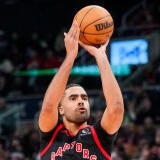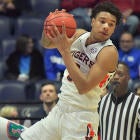
Magic's Chuma Okeke to reportedly wait a year to sign rookie deal after ACL rehab; here's why it makes sense for both sides
The Magic are getting creative in order to maximize the return on their No. 16 overall pick
Rookies sitting out part or all of their first year in the NBA due to injury is a fairly standard practice. Blake Griffin, Joel Embiid and Ben Simmons are some of the most famous examples, but given their stature as top prospects, all of them spent those injured years under contract. A year of team control evaporated as their organizations paid them to sit out, and they signed hefty extensions with fewer games under their belt than most superstars.
But the Orlando Magic are taking a different approach with their injured rookie. They selected Auburn forward Chuma Okeke No. 16 overall in June, but he is still recovering for a torn ACL suffered during the NCAA Tournament. He would have missed a significant chunk of the season at a minimum, and even on a normal recovery timetable could have missed his whole rookie year. The Magic are taking an innovative step in ensuring he won't have to rush back onto the court, according to Shams Charania of The Athletic. They plan to redshirt him for the entire season and allow him to make his debut during the 2020-21 campaign.
Here is where things get interesting. Whereas Griffin, Embiid and Simmons spent their rehab seasons under contract, Okeke will not. He will sign a G-League contract for this season, and then his NBA rookie deal in the 2020 offseason.
There are pros and cons to this arrangement on both sides. Okeke, provided Orlando holds up its end of the bargain and signs him for 120 percent of his rookie scale amount as is standard league protocol, will actually guarantee himself more money this way. The rookie scale increases with the cap each season, so the scaled amount for the No. 16 pick in 2020 is going to be higher than it was in 2019. He will also earn whatever his G-League contract guarantees him for this season.
Finally, rookie-scale contracts include team options for the final two seasons. Common sense dictates that these options are usually picked up. Why invest a first-round pick in a player you are prepared to dump after two seasons? Injury is one of the bigger exceptions. If Okeke got hurt again, or struggled out of the gate after his recovery, he might risk seeing the Magic decline one of his team options. Now, he will be able to return at full strength and put his best foot forward in Orlando.
That is why Okeke would agree to such an arrangement, but the Magic are the big winners here. Think of Embiid's first three seasons with the Philadelphia 76ers to understand why. He played only 31 games in that time, but spent two years under contract rehabbing. That meant he was still due a contract extension after his third season with very little proof that he could stay healthy. That carried obvious risk for Philadelphia, but it also robbed them of those precious rookie-scale salaries Embiid almost never played under. It only took him 31 games to get a long-term contract. It takes most first-round picks three years.
By taking this approach, however, the Magic won't have to pay Okeke not to play for them. They delay his free agency clock by a full year and ensure themselves four years of rookie-scale salaries for Okeke. If he plays up to their expectations, those years will have him grossly underpaid.
The added benefit here is that the Magic likely wouldn't have played a healthy Okeke much this season anyway. Most of their talent is concentrated in their front-court, and this offseason didn't help matters. Former No. 6 overall pick Mo Bamba is going to have to fight for playing time because the Magic re-signed starting center Nikola Vucevic and backup Khem Birch this summer. Aaron Gordon and Johnathan Isaac remain pillars at forward, but the Magic also signed Al-Farouq Aminu to a pricey deal.
There were no available minutes for Okeke here. Now the Magic won't even need to give him a roster spot. They can instead spend the season unclogging their front-court logjam, and can also dedicate Okeke's roster spot to a guard, which is an area of sore need for Orlando.
Delaying a first-round pick's rookie-scale contract is rare. The arrangement is typically agreed upon before the pick is made, as the Oklahoma City Thunder did with Josh Huestis in 2014 in order to save both money and a roster spot. This tactic has never been used as a workaround for injury, though, and in that sense, the Orlando front office deserves credit for finding a creative solution to the problem Okeke's health presented.


















